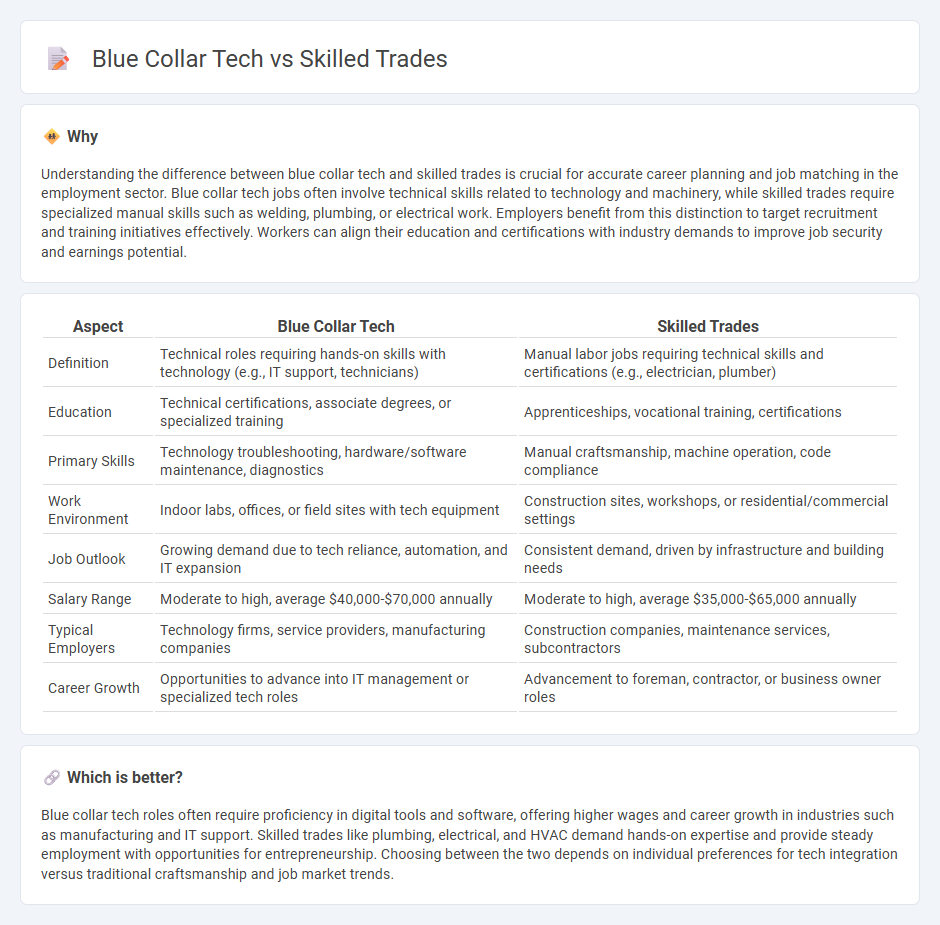
Blue collar tech jobs often involve working with advanced tools and technology in sectors like manufacturing, IT support, and telecommunications, blending technical skills with hands-on labor. Skilled trades encompass traditional professions such as electricians, plumbers, and carpenters, requiring specialized training and certifications to perform complex manual tasks efficiently. Explore the evolving landscape of employment to understand how these roles impact career opportunities and economic growth.
Why it is important
Understanding the difference between blue collar tech and skilled trades is crucial for accurate career planning and job matching in the employment sector. Blue collar tech jobs often involve technical skills related to technology and machinery, while skilled trades require specialized manual skills such as welding, plumbing, or electrical work. Employers benefit from this distinction to target recruitment and training initiatives effectively. Workers can align their education and certifications with industry demands to improve job security and earnings potential.
Comparison Table
| Aspect | Blue Collar Tech | Skilled Trades |
|---|---|---|
| Definition | Technical roles requiring hands-on skills with technology (e.g., IT support, technicians) | Manual labor jobs requiring technical skills and certifications (e.g., electrician, plumber) |
| Education | Technical certifications, associate degrees, or specialized training | Apprenticeships, vocational training, certifications |
| Primary Skills | Technology troubleshooting, hardware/software maintenance, diagnostics | Manual craftsmanship, machine operation, code compliance |
| Work Environment | Indoor labs, offices, or field sites with tech equipment | Construction sites, workshops, or residential/commercial settings |
| Job Outlook | Growing demand due to tech reliance, automation, and IT expansion | Consistent demand, driven by infrastructure and building needs |
| Salary Range | Moderate to high, average $40,000-$70,000 annually | Moderate to high, average $35,000-$65,000 annually |
| Typical Employers | Technology firms, service providers, manufacturing companies | Construction companies, maintenance services, subcontractors |
| Career Growth | Opportunities to advance into IT management or specialized tech roles | Advancement to foreman, contractor, or business owner roles |
Which is better?
Blue collar tech roles often require proficiency in digital tools and software, offering higher wages and career growth in industries such as manufacturing and IT support. Skilled trades like plumbing, electrical, and HVAC demand hands-on expertise and provide steady employment with opportunities for entrepreneurship. Choosing between the two depends on individual preferences for tech integration versus traditional craftsmanship and job market trends.
Connection
Blue collar tech and skilled trades are interconnected through their reliance on practical expertise and technical proficiency in industries such as manufacturing, construction, and maintenance. Skilled trades workers utilize advanced tools, machinery, and digital technologies to enhance productivity and safety in blue collar roles. This integration drives innovation and economic growth by merging hands-on craftsmanship with emerging technological advancements.
Key Terms
Apprenticeship
Skilled trades and blue collar tech careers both emphasize hands-on training through apprenticeship programs, which combine on-the-job experience with classroom instruction to develop practical skills. Apprenticeships in these fields often lead to industry-recognized certifications and higher earning potential, making them a vital pathway to career advancement. Explore in-depth insights on how apprenticeships shape the future workforce and open doors to diverse technical professions.
Certification
Certification serves as a critical benchmark in skilled trades, validating expertise in trades like plumbing, electrical work, and welding through recognized programs such as NCCER or AWS. In blue collar tech, certifications often emphasize modern technologies, including IT certifications like CompTIA or Cisco, reflecting the technical complexity behind roles such as HVAC technicians or robotics maintenance. Explore detailed comparisons of certification requirements and career prospects to understand how credentials shape these evolving work landscapes.
Automation
Automation is transforming both skilled trades and blue collar tech roles by integrating advanced robotics, AI, and programmable machinery to enhance efficiency and precision. Skilled trades such as electricians and machinists now rely heavily on digital tools and automation for complex problem-solving and system maintenance. Explore how automation is redefining job skills and opportunities in these industries.
Source and External Links
What is Classified as a Skilled Trade? - Berks Technical Institute - Skilled trades are occupations requiring specific skills and hands-on work, such as electricians, plumbers, welders, and carpenters, often needing specialized training from technical or trade schools combining classroom and practical learning.
Skilled Trades Career Exploring - This program offers young people hands-on experience and education in various skilled trades careers like carpentry, plumbing, electrician work, automotive repair, and culinary arts to explore potential career paths.
Online Skilled Trades Training Programs - Penn Foster - Penn Foster provides flexible online training programs for numerous skilled trades including carpentry, HVAC, electrical work, and plumbing, designed to fit learners' schedules at different credential levels from certificates to associate degrees.
 dowidth.com
dowidth.com